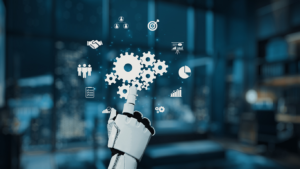Considering the tech dominance of the business landscape, it’s important to grasp the concept of Artificial Intelligence (AI). This field, rooted in computer science, strives to develop systems that can handle tasks usually performed by humans. AI’s influence spans from automation to machine learning algorithms, showcasing its broad and growing scope.
Exploring the Concept of Artificial Intelligence
The definition of artificial intelligence revolves around creating algorithms that empower machines to mimic thinking capabilities, such as learning from past experiences and comprehending language patterns to make informed decisions efficiently. In the past, AI was built on rule-based systems. Now, modern AI leans towards machine learning, which enhances system efficiency through effective data trend analysis. These advancements have expanded AI’s utility across sectors, making it a crucial component in various industries.
Varieties of Artificial Intelligence
There are three types of AI: Narrow AI focuses on specific tasks, like language translation or image recognition, and excels at them but cannot operate beyond their designated areas; General AI aims to mimic human cognitive abilities across various tasks, yet is still mostly theoretical; Superintelligent AI would surpass human intelligence, leading to ethical and practical implications that require consideration.
The Practical Uses of AI
AI has brought about significant changes in the workplace today. In the healthcare sector, for instance, AI-powered tools can examine images and forecast patient outcomes. Similarly, in finance, algorithms are used to identify fraudulent transactions and enhance trading techniques. Customer service has adopted chatbots to deliver responses and improve customer satisfaction. Furthermore, self-driving cars rely on AI for navigation, and smart home gadgets offer tailored assistance. These instances underscore the far-reaching impact of AI predictions across various areas of expertise.
Facing Difficulties When Implementing AI
While AI has promising possibilities ahead, there are hurdles to overcome in its implementation. Data quality and quantity play a crucial role in how well AI systems function. If the data is insufficient or biased, it can result in inaccurate forecasts. Moreover, ethical issues arise concerning how AI makes decisions, especially in fields like healthcare and law enforcement. Ensuring that AI systems operate transparently and justly is a key concern. Additionally, there’s the worry about job loss due to automation; striking a balance between technological progress and job preservation is crucial.
Exploring the Ethical Implications of Artificial Intelligence
Ethical concerns are vital in the advancement of AI technology as it progresses. It is essential to ensure that AI systems uphold privacy rights and avoid any form of bias while maintaining transparency throughout the development process. Developers play a crucial role in creating systems that prioritize fairness and accountability to minimize harm and unintended outcomes. Collaboration among tech industry experts, policymakers, and ethicists can help steer the evolution of AI technology.
The Role of AI in Our Lives
AI has become a part of our lives, and we do not even realize it at times. Virtual assistants help with various tasks, such as setting reminders and managing smart home devices. Personalized suggestions on streaming services and online shopping platforms enhance user interactions. Social media uses AI to monitor content and recommend connections. These common uses of AI demonstrate how it’s pervasive, making things easier and enhancing our daily experiences.
AI and Education
AI has greatly enhanced the field of education by customizing learning materials to suit each student’s needs and allowing them to advance at their own pace. Learning platforms provide virtual tutors alongside teaching techniques, offering educators valuable insights into student progress through AI-powered analytics systems. This transformation in the education sector empowers both learners and teachers by creating an efficient learning environment.
Summary
Artificial intelligence is known for its capacity to imitate thinking and plays a significant role in shaping the contemporary world. Its wide range of uses in various sectors and daily activities highlights its potential for driving change. Nevertheless, there are issues to address, such as data quality, ethics, and the impact on the workforce, that require consideration. By tackling these challenges head-on, we can leverage the advantages of AI while ensuring a fair future. As AI advances, it is poised to enhance capabilities and tackle problems further, paving the way for a future where humans and machines collaborate seamlessly.




